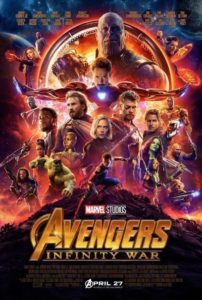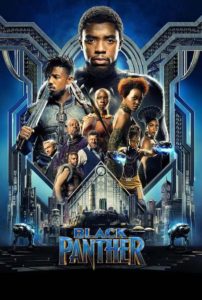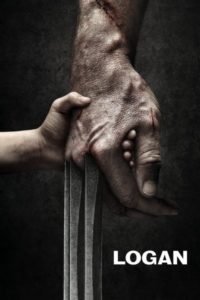
Many deem Christopher Nolan’s (
Interstellar, Oppenheimer)
The Dark Knight the best comic book movie ever. Those and others consider Nolan’s three
Batman films the quintessential superhero trilogy.
The Dark Knight is the franchise’s standout, successfully eclipsing the superhero genre and delivering an eerie tale of good versus evil that requires many chief characters to make layered, moral decisions at a moment’s notice. In particular, The Joker (Heath Ledger –
Brokeback Mountain, Monster’s Ball), the film’s villain, continually requires its protagonists to choose between what is best for them and society’s greater good. Fans of superhero movies and those who traditionally have little to no interest in that genre can equally appreciate
The Dark Knight.
Continue reading The Dark Knight (2008) →

Why did the Mad Titan Thanos (Josh Brolin –
W., Sicario) need to grab hold of the power of the six Infinity Stones to destroy the universe? I think it’s important to understand what causes a villain to do certain actions rather than just to have a bad guy. The stronger the villain’s arc and the more we sympathize with them on any level, the more we understand and appreciate the underlying of who they are. In
Avengers: Infinity War (directed by Anthony Russo and Joe Russo), we have a powerful bad guy motivated by a tortured past and willing to destroy all the good guys in the universe to atone for it. After the planet Titan is no longer inhabited, he is not allowed to prevent things from destroying it; he thinks he will prevent it. Instead, he lost his planet and everyone on it. Vowing not to let something like that happen again, he makes it his mission to balance the universe by completely wiping out half of it. But to do so, he’ll need all six of the Infinity Stones that will power his Infinity Gauntlet, allowing him to bend time, space, energy, and the laws of physics and reality.
Continue reading Avengers: Infinity War (2018) →

2009, the Academy of Motion Picture Arts and Sciences expanded on a tradition that had existed since 1927. It increased the number of potential Best Picture nominations from the usual five to a potential maximum of 10. It was a move to inject more blockbusters into the Oscar mix and to give movies like
Avatar, Inception, and
Toy Story 3 the recognition of Best Picture that they deserved. But in essence, this was
The Dark Knight rule. This 2008 film, the most incredible superhero movie ever made, was nominated for eight Academy Awards and won two (Best Supporting Actor – Heath Ledger, Best Achievement in Sound Editing).
Continue reading Black Panther (2018) →

James Mangold’s (
3:10 to Yuma, Walk the Line) Logan is about to set the standard for the next wave of superhero movies: the death of a significant character. In an age of film (particularly superhero ones) where we’ve seen sequels, prequels, and reboots, we have yet to see the story’s beginning, middle, and definite conclusion. We’ve seen plenty of superhero movies that COULD be a conclusion story, but we’ve all learned that we think the end isn’t the end unless we see that character killed off. And even then, we don’t know. When there is the potential for hundreds of millions of dollars to be made, who are we to believe that the end is the end? Often, the end is determined by a crappy movie in a series that doesn’t resonate with audiences or critics. Sometimes, that movie can be a concluding story, but often it is not. But (spoiler, but not really) based on what happens at the end of the film, I don’t expect to see him back. I probably will in another fashion, but that can be an argument for a different day. Until then, I’ll continue to sing the praises of
Logan. At the time of this review, I have it as one of the top five Marvel movies ever.
Continue reading Logan (2017) →
Movies I Watch That Inspire Me to Critique!
 Many deem Christopher Nolan’s (Interstellar, Oppenheimer) The Dark Knight the best comic book movie ever. Those and others consider Nolan’s three Batman films the quintessential superhero trilogy. The Dark Knight is the franchise’s standout, successfully eclipsing the superhero genre and delivering an eerie tale of good versus evil that requires many chief characters to make layered, moral decisions at a moment’s notice. In particular, The Joker (Heath Ledger – Brokeback Mountain, Monster’s Ball), the film’s villain, continually requires its protagonists to choose between what is best for them and society’s greater good. Fans of superhero movies and those who traditionally have little to no interest in that genre can equally appreciate The Dark Knight.
Many deem Christopher Nolan’s (Interstellar, Oppenheimer) The Dark Knight the best comic book movie ever. Those and others consider Nolan’s three Batman films the quintessential superhero trilogy. The Dark Knight is the franchise’s standout, successfully eclipsing the superhero genre and delivering an eerie tale of good versus evil that requires many chief characters to make layered, moral decisions at a moment’s notice. In particular, The Joker (Heath Ledger – Brokeback Mountain, Monster’s Ball), the film’s villain, continually requires its protagonists to choose between what is best for them and society’s greater good. Fans of superhero movies and those who traditionally have little to no interest in that genre can equally appreciate The Dark Knight.
 Many deem Christopher Nolan’s (Interstellar, Oppenheimer) The Dark Knight the best comic book movie ever. Those and others consider Nolan’s three Batman films the quintessential superhero trilogy. The Dark Knight is the franchise’s standout, successfully eclipsing the superhero genre and delivering an eerie tale of good versus evil that requires many chief characters to make layered, moral decisions at a moment’s notice. In particular, The Joker (Heath Ledger – Brokeback Mountain, Monster’s Ball), the film’s villain, continually requires its protagonists to choose between what is best for them and society’s greater good. Fans of superhero movies and those who traditionally have little to no interest in that genre can equally appreciate The Dark Knight.
Many deem Christopher Nolan’s (Interstellar, Oppenheimer) The Dark Knight the best comic book movie ever. Those and others consider Nolan’s three Batman films the quintessential superhero trilogy. The Dark Knight is the franchise’s standout, successfully eclipsing the superhero genre and delivering an eerie tale of good versus evil that requires many chief characters to make layered, moral decisions at a moment’s notice. In particular, The Joker (Heath Ledger – Brokeback Mountain, Monster’s Ball), the film’s villain, continually requires its protagonists to choose between what is best for them and society’s greater good. Fans of superhero movies and those who traditionally have little to no interest in that genre can equally appreciate The Dark Knight.
 Why did the Mad Titan Thanos (Josh Brolin – W.,
Why did the Mad Titan Thanos (Josh Brolin – W.,  2009, the Academy of Motion Picture Arts and Sciences expanded on a tradition that had existed since 1927. It increased the number of potential Best Picture nominations from the usual five to a potential maximum of 10. It was a move to inject more blockbusters into the Oscar mix and to give movies like Avatar, Inception, and Toy Story 3 the recognition of Best Picture that they deserved. But in essence, this was The Dark Knight rule. This 2008 film, the most incredible superhero movie ever made, was nominated for eight Academy Awards and won two (Best Supporting Actor – Heath Ledger, Best Achievement in Sound Editing).
2009, the Academy of Motion Picture Arts and Sciences expanded on a tradition that had existed since 1927. It increased the number of potential Best Picture nominations from the usual five to a potential maximum of 10. It was a move to inject more blockbusters into the Oscar mix and to give movies like Avatar, Inception, and Toy Story 3 the recognition of Best Picture that they deserved. But in essence, this was The Dark Knight rule. This 2008 film, the most incredible superhero movie ever made, was nominated for eight Academy Awards and won two (Best Supporting Actor – Heath Ledger, Best Achievement in Sound Editing).
 James Mangold’s (
James Mangold’s (